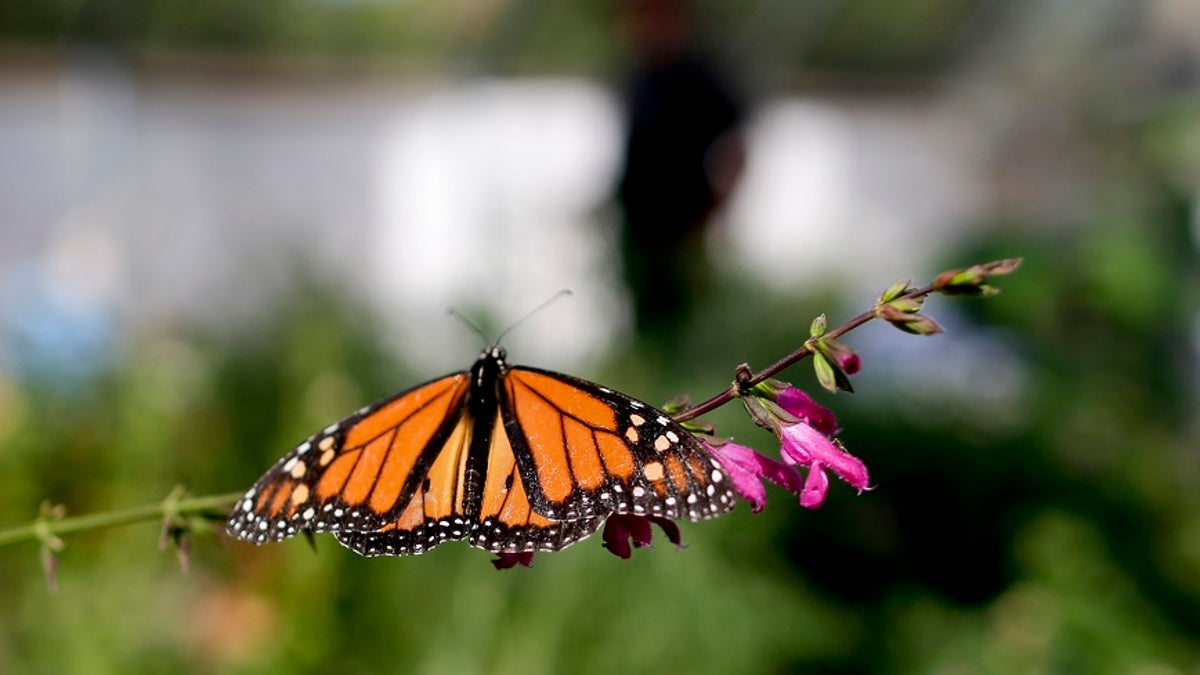
Researchers with an environmental group are labeling as "disturbingly low" the number of western monarch butterflies that migrate along the California coast. (AP Photo/Gregory Bull)
The population of western monarch butterflies in California’s coastal areas is apparently taking a nosedive.
Researchers with the environmental group Xerces Society, along with volunteers, take to the state’s coastal areas each year to count the number of overwintering monarchs. The data provides scientists the "best estimate of how well this beloved butterfly is doing," the group said. This year, the society announced that early counts show the population “has been reduced to less than 0.5 [percent] of its historical size.”
The early count numbers, though not yet confirmed, are “disturbingly low,” the group said.
CLICK HERE TO GET THE FOX NEWS APP
The preliminary count results are comprised of 97 sites, “which includes many of the most important overwintering sites,” the group said. Those same sites accounted for 77 percent — or 148,000 monarchs — in 2017. The following year, in 2018, the same areas only had 20,456 monarchs. This reveals an 86 percent decline since 2017, according to the society.
By comparison, the group in 1981 counted more than 1 million western monarchs wintering in California, the San Francisco Chronicle reported.
“While overwintering populations naturally fluctuate, even by double-digit percentages, the magnitude of this year’s drop is of significant concern because the monarch population was already at a new low after the 97 [percent] decline it has experienced since the 1980s, leading to a situation which may be catastrophic for the western population,” the Xerces Society said.
At this time, researchers aren’t positive what has caused the drastic decline, though they “suspect it occurred between the late overwintering season and early spring." There is no substantial evidence of a delayed migration and butterflies are not being reported in other parts of the country.
That said, researchers said the state’s weather in the past year could have been a contributing factor, citing severe drought and wildfires.
As for long-term impacts, the butterflies are threatened by pesticides, herbicides and destruction along their migratory route, scientists said, also noting climate change impacts could be a factor.
A 2017 study by Washington State University researchers found the species likely will go extinct in the next few decades if nothing is done to save it.
MORE THAN 100 PRAYING MANTISES HATCH ON CHRISTMAS TREE IN VIRGINIA HOME, WOMAN SAYS
"While western monarchs are facing unprecedented challenges right now, there is still hope that we can recover the population if we work quickly, strategically, and together,” the Xerces Society said in a statement, listing different things individuals can do to help preserve the species.
“Whatever work we do to protect or restore monarch-friendly habitat will also benefit many other pollinators such as bees and other butterflies, as well as many other wild and beautiful insects that are a cornerstone of ecosystems and provide us with a deep sense of connection to our natural world,” the group added.
The Associated Press contributed to this report.
